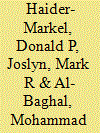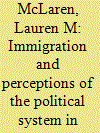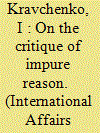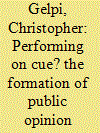| Srl | Item |
| 1 |
ID:
074607


|
|
|
|
|
| Publication |
2006.
|
| Summary/Abstract |
In political disputes, issue frames set parameters for debate and shape which view dominates. This study expands issue framing research to examine the influence of frames on the perception of future terrorist threats as well as subsequent support for related counterterrorism policies. We test several hypotheses using data from an experimental field poll. We find that issue frames clearly influence perceptions of threat. However, our frames, which posit specific terrorism threats, only have a limited influence on respondent preferences for counter-terrorism policies. We consider a variety of explanations for these results and provide direction for future research.
|
|
|
|
|
|
|
|
|
|
|
|
|
|
|
|
| 2 |
ID:
122470


|
|
|
|
|
| Publication |
2013.
|
| Summary/Abstract |
Recently published research contends that concern about immigration is weakening the British political system by creating distrust in the elites and institutions in this system. Some may challenge this finding because the public opinion data used to illustrate this relationship is limited to the period of the recent Labour government, raising the possibility that it was an artefact of that era and thus may no longer hold. Using the most recent round of the European Social Survey (2010-11), this paper investigates whether this finding holds in the present era. The findings indicate that under the current Conservative-Liberal Democratic government, concern about immigration is still related to negative perceptions of the political system. This finding, along with those reported in previous research, points to potentially serious negative consequences for the functioning of the British political system, which are discussed in the concluding section of the paper.
|
|
|
|
|
|
|
|
|
|
|
|
|
|
|
|
| 3 |
ID:
192431


|
|
|
|
|
| Summary/Abstract |
ONCE upon a time, in a disadvantaged province of a great empire, Pontius Pilate asked someone he thought was a little man from the deep people: "What is truth?" The source provides no response.1 Since then, the prefect's fate has been lost to history, and the eternal Rome enjoyed a mere 450-year moment in history. But the question, glorified, like the questioner himself, by the One Who Did Not Answer, has remained, making its way from theology into every field of scientific knowledge with the unbreakable tenacity of the Roman legions.
|
|
|
|
|
|
|
|
|
|
|
|
|
|
|
|
| 4 |
ID:
093685


|
|
|
|
|
| Publication |
2010.
|
| Summary/Abstract |
The public's inability to gain direct personal experience or information about American military operations means that individuals must rely on cues to form opinions about war. But in an environment filled will potential cues, which ones do Americans tend to rely on when deciding whether to support an ongoing military operation? This experimental study uses two distinct cues within the context of a newspaper story about the Iraq War to test four theoretical models of the American public's reliance on cues. The results provide fairly consistent support for the "surprising events" model of opinion formation, which suggests that individuals will attend to news events that conflict with their expectations in an effort to update their attitudes toward the war. These results also provide support for the cost/benefit perspective on the formation of public opinion toward war that underpins much of the literature on casualty tolerance during military conflicts.
|
|
|
|
|
|
|
|
|
|
|
|
|
|
|
|